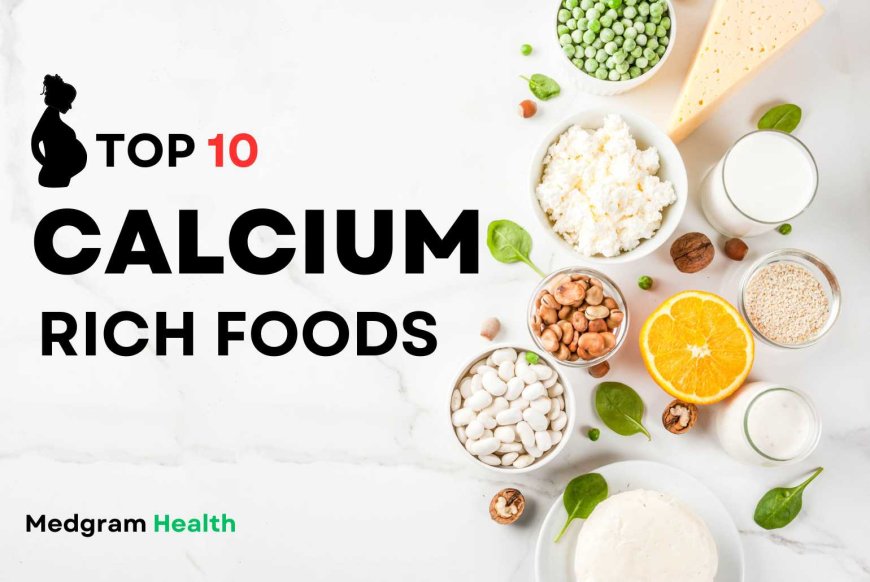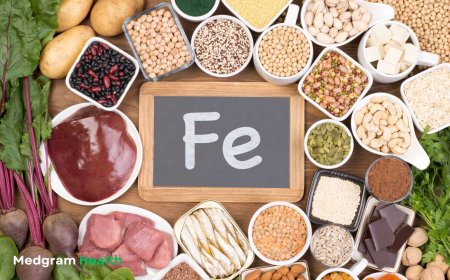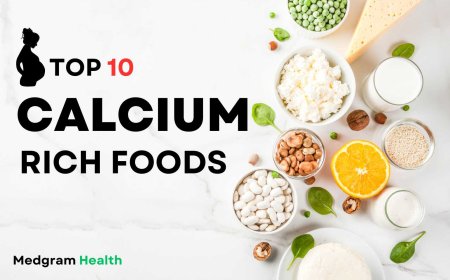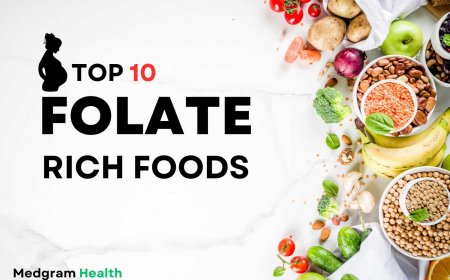Top 10 Calcium-Rich Foods for a Healthy Pregnancy
Discover the top 10 calcium-rich foods to include in your pregnancy diet for strong bones, fetal development, and overall health.

Calcium is a vital nutrient for a healthy pregnancy, as it plays a crucial role in fetal bone and teeth development, muscle function, and the circulatory and nervous systems. Ensuring sufficient calcium intake helps support the mother's bones while meeting the baby’s developmental needs.
Below, we explore the top calcium-rich foods that are beneficial for pregnant women, offering tips on how to incorporate them into a balanced pregnancy diet.
1. Dairy Products
- Examples: Milk, yogurt, cheese.
- Calcium Content: One cup of milk provides around 300 mg of calcium, while a cup of yogurt offers about 450 mg. (ref)
- Benefits: Dairy is an excellent source of easily absorbable calcium and also provides protein, vitamin D, and probiotics (from yogurt) for gut health.
- How to Include: Enjoy a glass of milk, add cheese to salads and sandwiches, or have a bowl of yogurt with fruit for a nutritious snack.
2. Leafy Green Vegetables
- Examples: Kale, collard greens, turnip greens, bok choy.
- Calcium Content: One cup of cooked collard greens has around 270 mg of calcium.
- Benefits: Greens are also rich in vitamins A, C, and K and provide antioxidants for overall health.
- How to Include: Add greens to soups, smoothies, or salads, or steam them as a side dish.
3. Fortified Plant-Based Milk
- Examples: Almond milk, soy milk, oat milk.
- Calcium Content: Fortified plant-based milk typically provides about 300 mg of calcium per cup.
- Benefits: These options are ideal for lactose-intolerant individuals or those following a plant-based diet, offering similar calcium content to cow’s milk.
- How to Include: Use in smoothies, cereals, or as a dairy substitute in cooking.
4. Tofu and Tempeh
- Calcium Content: A half-cup serving of calcium-set tofu can contain up to 430 mg of calcium.
- Benefits: Tofu and tempeh are plant-based protein sources that also provide iron, another essential nutrient during pregnancy.
- How to Include: Add tofu to stir-fries, salads, or scramble it for a calcium-rich meal.
5. Almonds
- Calcium Content: One ounce (about 23 almonds) contains roughly 76 mg of calcium.
- Benefits: Almonds are rich in healthy fats, protein, magnesium, and vitamin E, making them a great snack for pregnancy.
- How to Include: Eat almonds as a snack, add to oatmeal, or use almond butter as a spread.
6. Sardines and Salmon (with Bones)
- Calcium Content: Three ounces of canned sardines provide around 325 mg of calcium.
- Benefits: These fish are high in omega-3 fatty acids, which support fetal brain development, along with vitamin D to aid calcium absorption.
- How to Include: Add sardines to salads or make a salmon spread. Always choose low-mercury options when consuming fish during pregnancy.
7. Chia Seeds
- Calcium Content: One ounce (about two tablespoons) of chia seeds contains 177 mg of calcium.
- Benefits: Chia seeds are also rich in fiber, protein, and omega-3 fatty acids.
- How to Include: Mix chia seeds into yogurt, smoothies, or oatmeal. They can also be used to make chia pudding for a nutritious snack.
8. Fortified Orange Juice
- Calcium Content: One cup of fortified orange juice typically has about 300 mg of calcium.
- Benefits: Besides calcium, orange juice is rich in vitamin C, which enhances iron absorption.
- How to Include: Enjoy a glass with breakfast or use as a base for smoothies.
9. Figs
- Calcium Content: Half a cup of dried figs provides about 120 mg of calcium.
- Benefits: Figs are also high in fiber, antioxidants, and potassium, making them a nutritious addition to the pregnancy diet.
- How to Include: Snack on dried figs or add fresh figs to salads, oatmeal, or yogurt.
10. Broccoli and Other Cruciferous Vegetables
- Examples: Broccoli, Brussels sprouts, cabbage.
- Calcium Content: One cup of cooked broccoli offers around 62 mg of calcium.
- Benefits: Cruciferous vegetables are also high in vitamin C, fiber, and folate, supporting overall pregnancy health.
- How to Include: Steam broccoli as a side dish, add to stir-fries, or include in casseroles.
Why Calcium is Essential During Pregnancy
Calcium is crucial for:
- Bone Development: Helps build the baby’s bones and teeth.
- Muscle Function and Blood Clotting: Supports muscle contraction, nerve signaling, and blood clotting.
- Protecting Maternal Bone Health: If dietary calcium is insufficient, the body will draw calcium from the mother’s bones, potentially weakening them over time.
Tips to Maximize Calcium Absorption
- Pair with Vitamin D: Vitamin D helps the body absorb calcium. Sun exposure and foods like eggs and fortified milk can increase vitamin D levels.
- Limit Caffeine and Salt: Excessive caffeine and salt can interfere with calcium absorption.
- Divide Calcium Intake: The body absorbs calcium more effectively when consumed in smaller doses throughout the day.
Daily Recommended Calcium Intake in Pregnancy
- The American College of Obstetricians and Gynecologists (ACOG) recommends that pregnant women consume 1,000 mg of calcium per day. Teens (18 and younger) need 1,300 mg per day.
- Consult with your healthcare provider for personalized recommendations.
What's Your Reaction?













